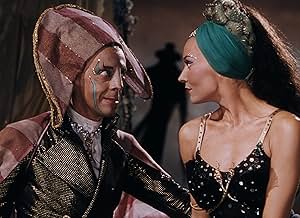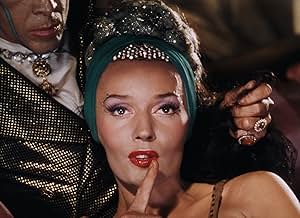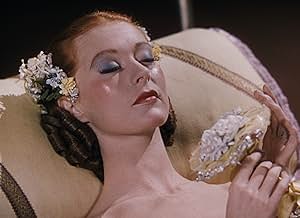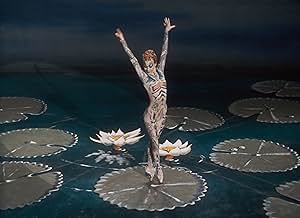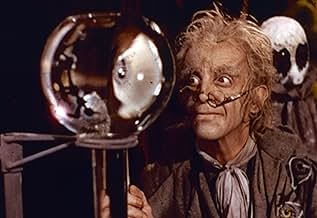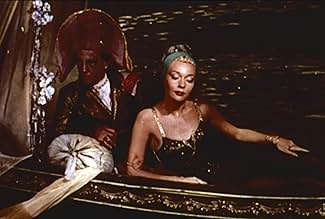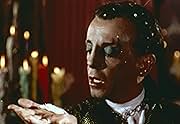Un poeta malinconico riflette su tre donne che ha amato e perso in passato: una bambola meccanica, una cortigiana veneziana e la figlia di un celebre compositore.Un poeta malinconico riflette su tre donne che ha amato e perso in passato: una bambola meccanica, una cortigiana veneziana e la figlia di un celebre compositore.Un poeta malinconico riflette su tre donne che ha amato e perso in passato: una bambola meccanica, una cortigiana veneziana e la figlia di un celebre compositore.
- Regia
- Sceneggiatura
- Star
- Candidato a 2 Oscar
- 2 vittorie e 3 candidature totali
- Giulietta
- (as Ludmilla Tcherina)
- …
- Spalanzani
- (as Leonide Massine)
- …
- Olympia
- (voce (canto))
- …
- Giulietta
- (voce (canto))
- …
- Nicklaus
- (voce (canto))
- …
- Antonia's Mother
- (voce (canto))
- Spalanzani
- (voce (canto))
- …
Recensioni in evidenza
With the audacity that Powell & Pressburger were famous for we are presented with a wonderful performance of a truly "composed" film. All the soundtrack was recorded by Sir Thomas Beecham and the Royal Philharmonic Orchestra and then the filming was all done on the open stage (it didn't need a sound stage) at Shepperton.
With choreography by Sir Frederick Ashton and performances by ballet luminaries such as Moira Shearer, Ludmilla Tchérina, Robert Helpmann, Léonide Massine and Sir Frederick Ashton himself. Assisted by opera stars such as Robert Rounseville and Anne Ayars and the Sadler's Wells Chorus. All this backed by the designs of Hein Heckroth and the experienced team of technicians that worked regularly under the banner of The Archers leads to a treat to behold.
The plot - from a 1951 (year of release) programme.
The Prologue : The Opera House in Nurnberg (Nüemburg). Hoffmann sits in the auditorium watching a performance of the Dragonfly ballet. He is in love with Stella, the prima ballerina, who seems the embodiment of all his past loves. In the interval Hoffmann goes to Luther's Tavern. Here young students greet him. He sings them the ballad of Kleinzack. But the sight of Stella has reopened old wounds. "Would YOU hear the three tales of my folly of love?" lie asks. The students gather round the punch bowl, with Hoffmann's companion, Nicklaus, who has accompanied him throughout his adventures, and his enemy Lindorf.
The Tale Of Olympia : As an inexperienced student in Paris, Hoffmann was tricked by two puppet-makers, Spalanzani and Coppelius, into falling in love with their latest creation, the doll Olympia. Spalanzani passes Olympia off as his daughter and hopes by this means to get some money from Hoffmann. At a ball given for her, Olympia sings the "Doll Song" and dances a ballet. Hoffmann is entranced. Only when Spalanzani and Coppelius fall out, and Coppelius destroys the doll in revenge does Hoffmann realise how he was fooled.
The Tale Of Giulietta : As a young man of the world, he was enslaved by a beautiful Venetian courtesan, Giulietta. Acting under the influence of the magician Dapertutto, Giulietta captures his reflection and so gains possession of his soul. Hoffmann kills her former lover Schlemil in a duel, to get the key to her room. He hurries back to her, but finds she has left with Dapertutto. Mad with rage, he flings the key against her mirror. It cracks, and his reflection reappears. He has regained his soul.
The Tale Of Antonia : As a mature artist and poet, Hoffmann falls in love with Antonia. Her mother, a singer, has already died of consumption (Tuberculosis). Crespel, her father, through grief at his wife's death, is now the half-mad wreck of a formerly great conductor. Crespel keeps his daughter in seclusion on an island in the Greek Archipelago and forbids her to aggravate her own weakness by singing. He also forbids his deaf servant Franz to admit either Hoffmann or the quack Dr. Miracle who killed his wife. Franz misunderstands, and in turn shows them in. Hoffmann realises Antonia is ill, and she promises him not to sing again. Dr. Miracle persuades her it is her mother's wish she should disobey. She does so, and dies in his arms.
The Epilogue : On the stage of the Opera House, it is the finale of the Stella Ballet. In the tavern Hoffmann's audience is spellbound. Hoffmann's tales are told and with the telling Hoffmann finds his true destiny as a poet. Stella appears at the door of the tavern and looks down at him. But Lindorf, who has also understood the meaning of the Tales goes to meet her and together they pass out into the town.
On first viewing, my reaction to it was mixed: it's impossible not to be impressed by the visuals (particularly the stylization of Hein Heckroth's colorful and imaginative designs) but, since I'm no expert in classical music, I wasn't bowled over by Jacques Offenbach's score (apart from the celebrated "Barcarolle" piece) - especially since the lyrics, despite being an English translation, aren't easily followed! However, listening to it with the Audio Commentary, I could better appreciate the way it was made and the special effects that were adopted; especially interesting was the fact that it was filmed silent, thus allowing freer camera movement. The main cast, apart from Pamela Brown, is made up of ballet performers and opera singers - with the former, mostly recruits from THE RED SHOES, carrying the more compelling screen presence.
The framing story - featuring an additional ballet composed by the film's conductor Sir Thomas Beecham - is a bit short, so that we mostly learn about the characters played by Robert Rounseville (as Hoffmann) and Robert Helpmann through their various guises in the former's three tales (which are themselves variable in quality):
i) the "Olympia" sequence, highlighting Moira Shearer and Leonide Massine, is overlong but quite charming; Helpmann's distinctive features are rather buried under some quaint make-up - though his violent destruction of Shearer (who plays a doll) makes for a quite unsettling moment!
ii) "Giulietta" is the best and most interesting sequence, but also the shortest: Ludmilla Tcherina is a very sensuous heroine, while Helpmann and Massine are wonderful (and wonderfully made up) as respectively an evil magician and a (literally) soulless officer under both their spell; this sequence features some incredible imagery - like Tcherina's reflection in water picking up the aria she is singing, her walking over sculptures of dead bodies, Rounseville and Massine's saber duel set to music (i.e. presented without any sound effects) and the scene in which Rounseville loses his reflection when tempted in front of a mirror by Tcherina
iii) the "Antonia" sequence is again too long (it was severely cut in the original U.S. theatrical release) and, because it's mostly straight opera, emerges as the most labored segment: Massine is pretty much wasted here, while Ann Ayars is nowhere near as captivating as Shearer or Tcherina; however, Helpmann's belated entrance as the satanic Dr. Miracle takes the sequence to another level, and especially memorable here is the scene where Ayars exits a room only to re-enter it from another door (which must have inspired a similar incident in Mario Bava's KILL, BABY, KILL! [1966]) and the one where Ayars and Helpmann's dancing figures are divided into four to fill up the entire screen - with the latter taking each of his guises in the different segments and, likewise, the former being replaced with the heroines of each tale (Moira Shearer appears twice here as she also plays Stella, Hoffmann's love interest in the framing story!)
The Archers' films are among my favorites - though I was somewhat underwhelmed by I KNOW WHERE I'M GOING! (1945; I still haven't purchased the Criterion SE), THE BATTLE OF THE RIVER PLATE (1956; amazingly, both of my two attempts to view it in the past have only managed to put me to sleep!) and, now, THE TALES OF HOFFMANN. I've yet to watch 4 of their collaborations - CONTRABAND (1940; I've been tempted, time and again, to buy Kino's bare-bones DVD but the over-inflated price always got in the way!), THE ELUSIVE PIMPERNEL (1950), GONE TO EARTH (1950; this troubled production isn't likely to see the light of day on R1 DVD anytime soon, but is at least available via a budget-priced R2 edition), and their last 'musical' together OH, ROSALINDA! (1955). I would also like to watch Powell's solo films HONEYMOON (1959) and BLUEBEARD'S CASTLE (1964), which are yet two more musically-oriented ventures.
The story begins in Nuremberg as Hoffmann watches the object of his affections, Stella (Moira Shearer) dance a ballet. During the intermission, he goes into a tavern and tells the customers about his three major affairs.
Opera singers, with two exceptions, dub the stars, who are mostly from the ballet world; several will be familiar from The Red Shoes: Moira Shearer, Ludmilla Tcherina, Robert Helpmann, Léonide Massine, and Frederick Ashton. Only Hoffmann, Robert Rounsville, and Antonia, Anne Ayars, do their own singing. The rest of the vocals are provided by Dorothy Bond, Margherita Grandi, Monica Sinclair, Joan Alexander, Grahame Clifford, Bruce Dargavel, Murray Dickie, Owen Brannigan, Fisher Morgan, and Rene Soames.
Both the singing and dancing are absolutely magnificent, the beautiful Shearer dancing much better than she did in The Red Shoes several years earlier, and Powell and Pressburger fill the opera with fantastic effects and colors. My favorite is Shearer's doll ballet sequence, with the glorious coloratura singing of the Doll Aria by Dorothy Bond, a discovery of Sir Thomas Beecham, who conducts the orchestra. Tragically she was killed in a car accident the next year; she deserved to be one of the most famous sopranos who ever lived.
There are a couple of problems with this incredible piece. It's done in English, which due to the tamber of the high soprano voice, can make it difficult to understand. So people who know the opera would probably enjoy it the most. Secondly, it's not paced very well - there are some very draggy sections; some of the chorus work could have been cut.
The overall effect for the eyes and ears is fabulous, but "The Tales of Hoffmann" leaves one depressed for how far we've fallen culturally in this world. Imagine mounting this film today. How many people would attend? Five?
Lo sapevi?
- QuizGeorge A. Romero, writer/director of La notte dei morti viventi (1968) and Zombi (1978) has cited this as his all-time favorite movie, saying that it was the one that originally inspired him to get into filmmaking.
- BlooperGiulietta's necklace is turned from jewels to wax by Dapertutto, however, in a longer shot, it is briefly shown as jewels again, before a close-up, where it is wax again until Dapertutto changes it back to jewels.
- Citazioni
Chorus of Students: Some drink, drink, drink, drink, drink: do you hear us about? You lazy lout! We want some beer; we want some wine! Pour out the wine, and drink and drink till morning. Pour out the wine for drinking is divine. It is divine. We want some beer; we want some wine. We want some beer; we want some wine.
- Curiosità sui creditiIn the end credits, main actors appear taking curtain calls next to the singers who dubbed them.
- Versioni alternativeThe complete 138-minute version was available in 16mm black and white early television prints. The complete 138-minute version was also available in 16mm Kodachrome (color) rental prints. The complete 138-minute soundtrack was available for many years on LP (London Records).
- ConnessioniFeatured in The Late Show: Michael Powell (1992)
- Colonne sonoreThe Tales of Hoffmann, A Fantastic Opera
Music by Jacques Offenbach
Arranged by Thomas Beecham (uncredited)
English libretto by Dennis Arundell
From the French text by Jules Barbier
Conductor: Thomas Beecham (as Sir Thomas Beecham Bart.) with The Royal Philharmonic Orchestra
Sung by Robert Rounseville, Dorothy Bond, Margherita Grandi, Ann Ayars (as Ann Ayars), Monica Sinclair, Joan Alexander, Grahame Clifford, Bruce Dargavel, Murray Dickie, Owen Brannigan, Fisher Morgan, Rene Soames, and The Sadler's Wells Chorus
I più visti
Dettagli
- Data di uscita
- Paese di origine
- Lingua
- Celebre anche come
- Los cuentos de Hoffman
- Luoghi delle riprese
- Aziende produttrici
- Vedi altri crediti dell’azienda su IMDbPro
Botteghino
- Lordo Stati Uniti e Canada
- 91.930 USD
- Fine settimana di apertura Stati Uniti e Canada
- 23.340 USD
- 15 mar 2015
- Lordo in tutto il mondo
- 140.714 USD
- Tempo di esecuzione
- 2h 13min(133 min)
- Proporzioni
- 1.37 : 1



